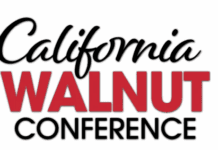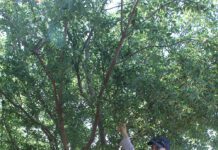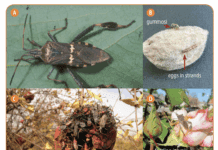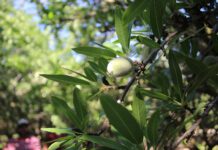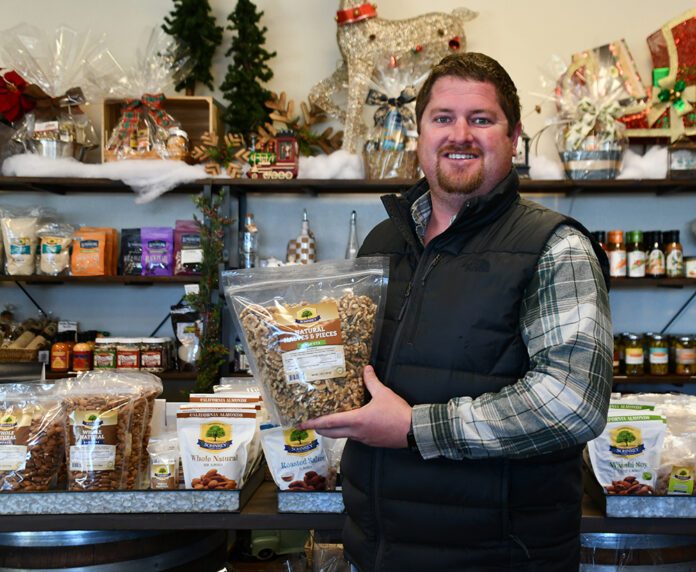
When the Sohnreys started their retail and food manufacturing businesses near Oroville, Calif., about nine years ago, they wanted to vertically integrate and capture more value from their crops. But launching Sohnrey Family Foods also was part of a transition plan to create new opportunities so the three sons, who are fifth generation, could join the family business. And they’re already looking to the sixth generation.
“All of us are entrepreneurial,” said Derek Sohnrey, who farms with his brothers, Alex and Andrew. “Now we’re going from three brothers to eight cousins, and we all want the opportunity for our kids to have what we have, so it’s a way to grow. That’s another reason for the gift shop. We started it already looking to the next generation.”
Adding retail and manufacturing wasn’t without its headaches as Derek called it “a whole ’nother beast compared to just growing crops.”
“We’re farmers, and retail is difficult,” he said, laughing. “We learned that extremely well and fast once we dove into that market. There aren’t many slow times for us anymore. Between planting and harvesting, the slower months we used to have are now tied up with retail, which is fine. It’s just busy. We like to be busy.”
Five Generations of Growers
Derek’s great grandparents headed west from Kansas with a wagon and mule team in the early 1900s and settled in the northern Sacramento Valley. Over the years, the family has produced a myriad of commodities, including rice, almonds prunes, walnuts, beans, hay, row crops, cattle, bees and catfish.
Today, the Sohnreys grow almonds and rice, since the timing of cultural practices for each crop tends to be complementary and allows them to make the most of their employees. Their father, Greg, who is fourth generation, has stepped back from day-to-day operations but still helps out when needed. Their cousin, Mike Sohnrey, is also part of the business and grows walnuts and prunes.
The Sohnreys farm fields and orchards from just south of Chico to near Beale Air Force Base in Yuba County.
Derek pointed to his father for laying a foundation for their success that involved providing each son with real-life farming lessons and renting them ground.
“We had to set it up and get a loan, but it made all the difference in the world,” Derek said. “It also made us hungry to expand and get more ground.”
reg said he was pleased that all three sons decided to follow in agriculture. “All three boys are working here and doing a good job,” Greg said as he helped out in the back end of the gift shop during the busy holiday season.
Taking the Retail Plunge
The family had been talking for some time about making the plunge into retail. When Derek graduated from Chico State University and returned to the farm, they figured the timing was right.
“We work so hard to produce these crops, we’d love to see people enjoy them and be able to vertically integrate and cut out some middlemen,” Derek said. “We’re adding value and controlling our own destiny a little bit. Being able to see our work go from a baby almond tree all the way to an adult almond tree and into the mouths of our consumers and customers adds another layer of pride into the work we do.”
The Sohnreys founded the retail business in 2014 and at the time had another company apply flavorings to their almonds. But Derek said they weren’t happy with the quality and decided to start their own food manufacturing business a year later.The food manufacturing facility, which has already undergone an expansion, sits in a building adjacent to the gift shop just off Highway 99 near Oroville. Derek’s cousin, Cyrus Fountain, develops the flavors “through a lot of trial and error and a lot of taste testings at family get-togethers. And I do a lot of research on my own.”
Over the years, he’s come up with a host of sweet and savory flavors as well as limited-edition ones, like orange crème- and pumpkin pie-flavored almonds.
They also produce almond butters in four flavors: snickerdoodle, which Fountain said was based on his mom’s Snickerdoodle cookies, chocolate, maple and natural.
Although Fountain said he has no formal chef or food technology training, he likes to cook and experience new flavors. He also is responsible for the gift shop’s back end, forecasting retail production, and ensuring gift baskets and boxes are assembled on time. In addition, Fountain oversees shipments for their online customers.
Retail: ‘A Whole ‘Nother Beast’
About five times a year, Derek’s cousin Brenda Sohnrey and aunt Sylvia Sohnrey redecorate the gift shop to keep things fresh. Along with gift shop manager Ashlee Smith, they also attend trade shows and other events to stay up to date on the latest consumer trends.
The brick-and-mortar gift shop and online store at www.sohnreyfamilyfoods.com are just part of the Sohnreys’ retail efforts. They also sell through local grocery stores and an Amazon storefront.
What they don’t grow and produce themselves, they try to source locally. In fact, about 80% of the items they sell in the gift shop and online are made by small, local businesses. Only a few items used to fill out gift baskets, such as stuffed animals or cutting boards, are manufactured elsewhere.
Dealing with the different labor requirements on the retail side is something the Sohnreys have had to adapt to over the years. The jobs, for example, differ from those on the farm.
During slow times, they try to keep people employed while during busy months, trying to hold onto workers “is always fun to deal with,” Derek said.
He admitted the retail side won’t make them rich, at least in the near future, but the family remains committed to it because of other intangible benefits.
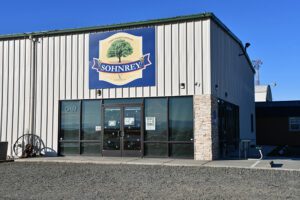
“The reason we keep it is we’re providing nine to 11 full-time jobs, with my cousin being one of them,” Derek said. “And we have a big impact on the community and other small businesses. For some of these small businesses, we’re their biggest seller.”
He also sees the gift shop as an opportunity to educate consumers about agriculture and the benefits it provides. As an example, Derek pointed to adjacent harvested rice fields flooded during the winter. Frequently, they’re filled with noisy geese and other waterfowl feeding on rice leftover after harvest.
“It helps make that connection, and once they make that connection, they don’t forget,” Derek said. “It’s not just good for us, but it’s good for all of ag.”
While their retail business continues to grow, Derek said they still sell the bulk of their crops through more traditional wholesale outlets like Blue Diamond Growers, Riverwest and Bear Republic Nut for their almonds and Pinnacle Rice Co-op for their rice.
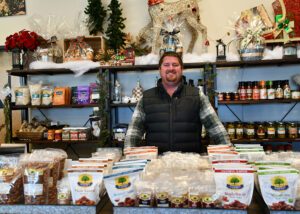
Attention to Detail in the Field
The same attention to detail they use in the gift shop and food facility also is applied to their crops. They currently use drones and satellite imagery to get a birds-eye view of potential problems in their rice fields.
In their almonds, they use moisture sensors to gauge irrigation timing. They also use pressure bombs and the online Pressure Bomb Express to make sure the water in the soil makes its way into trees and they aren’t water stressed.
In 2023, Derek said they tried a FloraPulse microtensiometer in one orchard, and he planned to add two more units this season. The sensor, installed in a small wound made in the tree trunk or scaffold, measures how much tension the tree is using to move water from the soil through the xylem, or water-carrying tissue. It reports stem water potential readings every 20 minutes.
“For us, the pressure bomb itself is nice, but it’s so labor intensive that it’s hard to be consistent with it,” he said. With the FloraPulse, Derek can pull up readings anytime on his phone to determine whether the tree needs additional irrigation or is fine.


